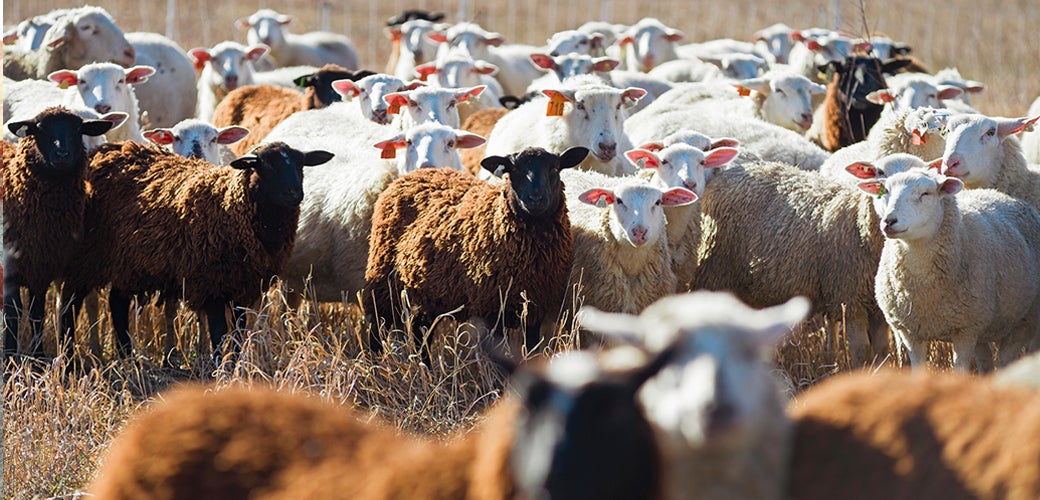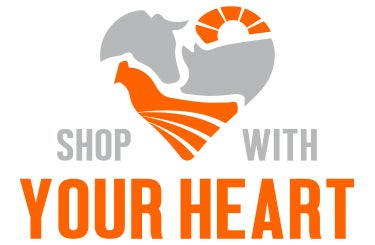
Business: Central Grazing Company
Location: Lawrence, Kansas
Operation profile:
- ≈1,000 sheep
- Partners with 19 farms across the United States
Certification: Certified Animal Welfare Approved by A Greener World (sheep)
Background
Jacqueline Smith and ReGina Cruse purchased their 80-acre farm in northeast Kansas to raise sheep as a means of promoting prairie restoration while allowing the sheep to “live natural and instinctive lives.” The surrounding land had formerly been used for crop and hay fields, leaving the soil depleted of nutrients. To restore the prairie and mimic the natural predator/prey relationship, Jacqueline and ReGina holistically graze their 150 sheep by rotating them among different areas. This practice allows the grasses to develop longer root systems, making the land more resilient to extreme weather events. The farm has been Certified Animal Welfare Approved (AWA) by A Greener World (AGW) since its founding in 2015.
Prior to purchasing this land, Jacqueline was a certified AWA dairy sheep farmer. When her original dairy sheep operation expanded, the number of lambs also increased, but Jacqueline realized there was no market for them. In response, she created Central Grazing Company to clean up the supply chain and sell the animals into the pastured meat market rather than put them up for auction and increase the chance they would end up in feedlots.
Central Grazing Company began operating with two farms—including Jacqueline and ReGina’s—and approximately 75 sheep. It now works with nineteen different farms across the country to aggregate, brand and distribute lamb to wholesale and retail markets. Last year, it processed over 700 sheep and anticipates it will process approximately 1,000 this year.
To find farm partners, Jacqueline and ReGina reach out to sheep farms that are already Certified AWA, or they are contacted by farmers who want to supply to Central Grazing Company and may or may not already be Certified AWA. Jacqueline works with potential farm partners who aren’t currently Certified AWA to help them achieve that requirement. If the farms are not raising their sheep on grass, they must also agree to make that change. Jacqueline works closely with the AGW program throughout the process of certifying potential farm partners. While she does not see what specific corrective measures AGW has suggested, she does know if the farms become certified and when they are audited. Once a farm has earned AWA certification, Jacqueline personally visits the farm to ensure that it meets Central Grazing Company’s specifications. The farms that contract with central Grazing Company receive 50% of the company’s net profits and are paid competitive market rates for their lamb.
Central Grazing Company adheres to several goals that guide its operations: (1) raising lambs ethically; (2) regenerating grasslands; (3) creating economic incentives for “independent, regional, or organic farmers”; (4) providing livable wages; and (5) building a “traceable supply chain.”
Getting Certified
When deciding on an animal welfare certification, Jacqueline looked into other programs but decided on AWA because of its “higher” standards that align with her values. Jacqueline has always respected AWA’s strict guidelines and its alignment with Central Grazing Company’s mission and goals.
Jacqueline, among other farmers, finds the audits to be rigorous, but noted that the auditors are friendly, respectful and understanding. For example, when AGW visited Jacqueline’s farm, the auditor noted that the farm did not have the breed of animal appropriate to the type of operation she was running, as she had dairy sheep rather than meat sheep. Jacqueline was able to explain that she was culling the animals naturally; she had dairy sheep remaining from her previous farm but once they were culled, she would introduce meat sheep to the farm. In addition, she was able to negotiate a feeding requirement that met the needs of her animals. In her experience, providing information to AGW prior to a farm visit can make the process more efficient.
AWA Certification Outcomes
Benefits to Animals. Central Grazing Company was founded to ensure that lambs would not enter the feedlot system. By requiring that supplying farms become Certified AWA, Central Grazing Company ensures that higher welfare standards are applied across a larger number of farms. As the company scales up, so does the number of AWA-certified farms.
Market Access. Central Grazing Company markets its lamb as Animal Welfare Approved on its website, promotional materials and packaging. Because the AWA certification is considered the most rigorous, Jacqueline and ReGina have found that they are able to differentiate their products and increase market share over their competitors. Due to its certification, Central Grazing Company is also a gold partner with Natural Grocers, a national retail chain.
Identifying Networks of AWA Farmers. Jacqueline cites the ability to identify networks of certified AWA farms as one of the greatest benefits to certification. The networking and resulting partnerships have allowed Central Grazing Company to grow and scale up in a manner that is consistent with the company’s goals.
Why Certify with AGW?
Central Grazing Company became Certified AWA by AGW to further its goal of raising sheep ethically while restoring grassland and promoting networks of small farms that support local and regional economies.

 Take the Shop With Your Heart survey and get materials that will help you make great shopping decisions.
Take the Shop With Your Heart survey and get materials that will help you make great shopping decisions.
